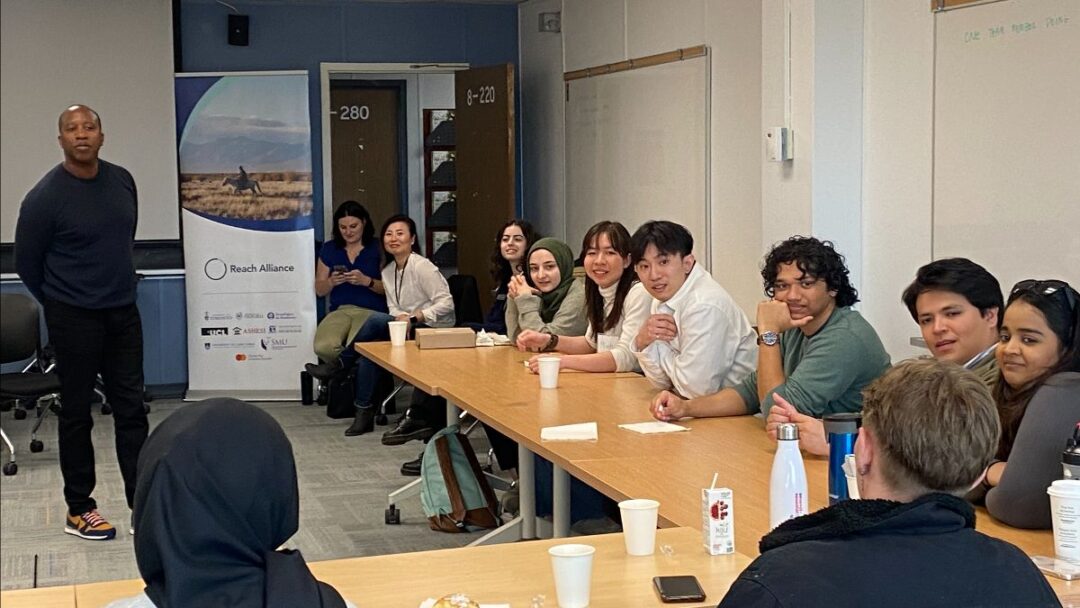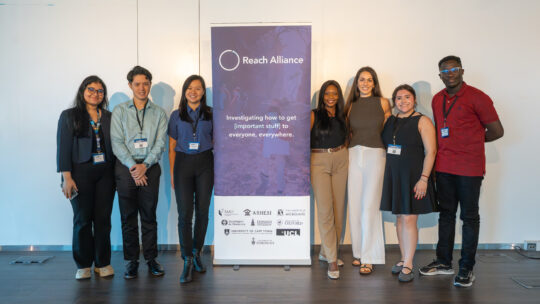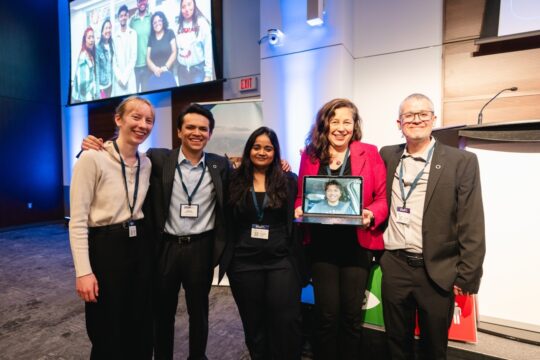News
Leading Boldly: How Team-based Leadership Coaching Powers Our Research Teams

The Reach Alliance sat down for a Q+ A with Jason Sealy, Founder, Sealy Coaching and Performance Inc. to uncover insights, swap stories, and maybe even learn the secret to unstoppable leadership
What have you learned about developing emerging leaders during your time as a leadership coach with the Reach Alliance?
One of the key insights has been understanding the difference between results and high performance. Results are outcomes, but high performance happens when those outcomes are amplified by sustained focus, grit, and full engagement. Coaching helps researchers not only achieve success but also learn how to sustain that level of excellence.
Another lesson is that uninformed optimism can lead to disengagement. These students are highly driven, but without clear feedback and a realistic path forward, they risk burnout. That’s why the role of Faculty Mentors, Program Officers, and Coaches is so vital. Every interaction is an opportunity to help researchers refine their mental models, shed unproductive habits, and adopt practices that accelerate growth.
As my colleague Gloria Eid puts it, leadership development is less about giving answers and more about creating the space for self-trust, courage, and authentic voice to emerge. With the right frameworks and peer practice, researchers begin to see themselves as capable leaders. Anowa Quarcoo adds that many young leaders place immense pressure on themselves, often losing track of who they’re trying to serve. Coaching offers a space to normalize mistakes, build confidence, and “fail forward” in a supportive environment.
What leadership development frameworks is the Reach Alliance now using to assess growth in its researchers?
We’ve introduced a structured pre- and post-program approach that combines both quantitative and qualitative data. It focuses on observable shifts in leadership behaviour, confidence, and competency. At the core is the Leadership Practices Inventory, which tracks growth in areas like values-based leadership, vision-setting, innovation, collaboration, and resilience.
In addition to behaviour-based metrics, we look at self-reported confidence in leading multidisciplinary teams, decision-making in ambiguous contexts, and skills in stakeholder engagement. This is supported by a suite of tools—including coaching worksheets and feedback surveys—designed to help participants prepare, reflect, and build on each coaching session.
Researchers complete baseline self-assessments at the start of the program and revisit them at the end to capture key insights, confidence shifts, and growth. This process not only informs our understanding of impact but also offers personalized development reports and helps us continuously refine our coaching model.
How has the Reach Alliance evolved in its leadership development approach?
Initially, the focus was heavily on research outputs. But as Professor Joseph Wong has said, “If the best thing produced is the report, we’ve failed these students.” Over time, the Reach Alliance has come to view teamwork as a powerful crucible for leadership development. The environments researchers operate in are complex with unpredictable conditions that demand humility, adaptability, and interdisciplinary collaboration.
Our coaching approach has shifted accordingly. We now centre performance as the combination of results and full engagement and have adopted an Integrated Support Team model that frames teamwork not just as a challenge but as a real-time learning opportunity. Researchers build critical meta-skills like resilience, clarity, and collaborative problem-solving—skills that prepare them for complex global contexts beyond the program.
Can you share examples of how coaching has made a tangible difference for researchers?
We’ve seen powerful transformations. Gloria Eid notes moments where researchers move from overwhelm to clarity, turning conflict into collaboration and recognizing personal strengths they hadn’t yet named. These shifts often lead to deeper team cohesion and stronger personal confidence.
Anowa Quarcoo has witnessed researchers grow through conflict resolution. What could become team-breaking moments are instead used as catalysts for learning essential leadership skills—skills they’ll carry well beyond their Reach Alliance experience. When a team navigates difficulty and comes out stronger, it’s a defining moment in their leadership journey.
What role does one-on-one coaching play in supporting leadership development?
One-on-one coaching offers a confidential, reflective space where researchers can process challenges outside the group dynamic. Gloria Eid describes it as a safe space where students can express doubts, reframe problems, and identify patterns that may be holding them back. With curiosity and compassion, they’re supported in finding practical new strategies.
Anowa Quarcoo emphasizes how individual coaching empowers quieter team members to find and use their voice—leading to stronger, more balanced team dynamics. This personal growth often complements and amplifies the impact of team-based coaching.
Looking ahead, what’s next for leadership development at Reach Alliance?
The future of leadership development at the Reach Alliance continues to be anchored in the belief that teamwork is the crucible of leadership. Success won’t be defined by having all the answers, but by developing the meta-skills—adaptability, clarity, collaboration, and resilience—that today’s global leaders need.
We’ll keep focusing on self-awareness, real-world responsibility, and the ability to learn from failure. Ultimately, the goal is to prepare researchers not just for their next career step, but for a lifetime of meaningful, cross-cultural leadership.


